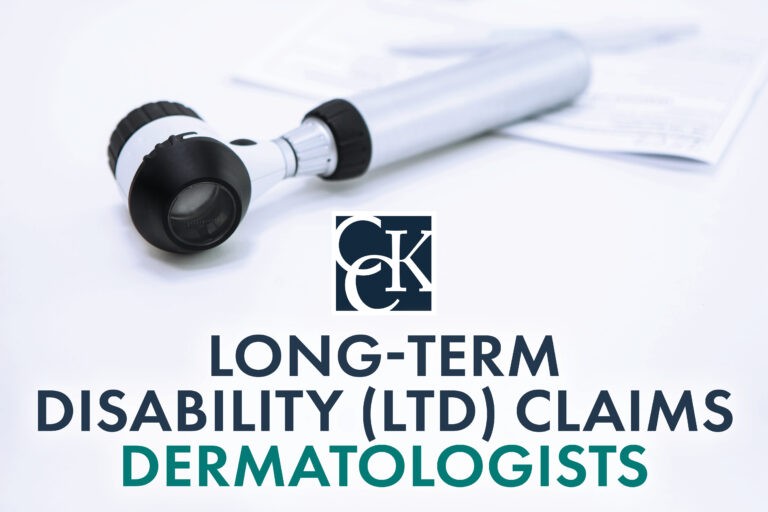Long-Term Disability (LTD) Claims for Dermatologists

Dermatologists are medical professionals who specialize in conditions of the skin. As such, many individuals rely on them to treat conditions involving their skin, hair, and nails. As such, dermatologists have a sense of duty to these patients and want to help them as best they can.
However, if a dermatologist suffers from a debilitating medical condition that prevents them from working, it not only affects them but their patients too. In such situations, it may be necessary for a dermatologist to file for long-term disability (LTD) benefits.
While these benefits are important to many professionals who are unable to work due to a disability, they are not always the easiest to obtain. A dermatologist facing the prospect of not working should consider filing a claim for these benefits. This article will address, among other things, why dermatologists may need long-term disability benefits and how they can begin the LTD claim process.
Dermatologists and Long-Term Disability Benefits
A dermatologist may have a long-term disability policy that protects their income when they become disabled. Typically, these benefits are obtained either through an employer (i.e., a “group” policy) or directly through the insurance company (i.e., an “individual” policy). Many dermatologists may own their own practice and, therefore, are likely to have an individual policy.

Yet many dermatologists do work in offices and hospitals where they receive a benefits package through their employer. If a dermatologist is unsure which type of policy they have, they can always inquire with their human resources department. Moreover, some dermatologists may have both types of policies at once.
A dermatologist needs to know which policy they have because it can affect how their long-term disability claim works. For example, a group policy is subject to ERISA — a federal law. However, ERISA does not govern individual policies. ERISA is a complex law that often benefits the insurance company. Therefore, it is important to understand what your claim requires to be compliant with this law.
Why Would a Dermatologist Require Long-Term Disability Benefits?
A dermatologist specializes in conditions of the skin, hair, and nails. As such, they can detect, diagnose, and treat over 3,000 conditions. Many people rely on these medical professionals for their health. The skin is an important organ that requires care, and when a dermatologist cannot adequately serve their patients, they put them all at risk.
LTD benefits can protect a percentage of a dermatologist’s pre-disability earnings, serving as a valuable lifeline to cover expenses. Medical treatment is both necessary and costly. To receive benefits, a claimant must show the insurance company that they are continuing to visit their doctor for treatment. Thus, protecting one’s income is a priority.
The Definition of Disability for Dermatologists
A debilitating medical condition or injury can make it impossible for a dermatologist to work. When filing a long-term disability claim, the insurance company will look to the occupational duties of the claimant to determine if their disability meets the definition of disability within their specific policy. In other words, does the disability in question prevent the dermatologist from performing the duties of their profession? The answer to this question lies within the policy’s definition.

Usually, an LTD policy will include either an own occupation definition or an any occupation definition. In certain policies, a dermatologist may initially have an own definition that — after a set period — transitions to an any definition.
The own occupation definition asks whether the dermatologist can perform the duties of their specific job, i.e., their own job. Conversely, the any occupation definition asks whether the dermatologist can perform the duties of any job at all. As such, the any occupation definition is typically harder to prove.
Many insurance companies still use the Dictionary of Occupational Titles (DOT). The DOT is a comprehensive manual of job titles and their duties, but it often does not list all the duties of a specific job. The DOT was last updated in 1991. Some insurers may use the more updated O*Net Database too. Nevertheless, the DOT entry for dermatologists begins as follows: “Diagnoses and treats diseases of human skin: Examines skin to determine nature of disease, taking blood samples and smears from affected areas, and performing other laboratory procedures.”
When filing a claim, you must prove your disability meets whichever definition exists within your policy. Some dermatologists may decide to handle this on their own; however, even a minor mistake could be detrimental. A long-term disability attorney can help tremendously with preparing and submitting a strong claim for long-term disability benefits.
Since a dermatologist is a medical professional, they will likely have an own occupation policy. However, it is vital that all claimants thoroughly read their policies to verify which definition they must prove. This definition will affect what kinds of evidence and documentation they must provide to prove their case.
Understanding Long-Term Disability Policies
Regardless of whether you have a group or an individual policy, you must read its contents. Every long-term disability policy contains essential information for filing (or appealing) a claim. However, many claimants fail to understand the contents of their policy, which can result in a denial of their claim.

Unfortunately, LTD policies are often hard to understand. If you are not sure of a certain provision within your policy, it is best to consult with an experienced long-term disability lawyer. Such attorneys understand these policies and what they contain. While every insurer will have a slightly different policy, the principal elements are the same.
For example, many policies include limitations and exclusions. A limitation limits the benefits you may receive depending on certain factors, such as the specific condition or how you got the condition. Likewise, a condition that is listed as an exclusion will not be covered by the policy at all.
Further, several filing deadlines are within your policy. It is easy to miss one, but these deadlines are important. When you develop a condition, you must make a note of the day on which your symptoms began. Most policies require you to file your initial claim within 180 days of this date — though this timeline can vary based on your specific policy.
Collecting Evidence to Prove Your Disability
Many medical conditions can prevent a dermatologist from performing their job. A dermatologist must have sharp cognitive skills, excellent communication skills, and the ability to carefully operate on patients. This list is not exhaustive. Nonetheless, a condition that affects their cognitive abilities (e.g., insomnia) or their physical abilities (e.g., degenerative disc disease), can make it impossible to work.
Evidence is key when filing an LTD claim. Insurance companies prefer objective evidence, meaning medical records, X-ray results, and other tests or scans. Some claimants may find that their medical records are sufficient to prove their disability, but other claimants may need to submit supplemental evidence to their insurer.

Supplemental evidence can include additional medical or vocational evaluations, and it can also include witness statements and/or personalized reports from their doctors.
Collecting all this evidence can be daunting, but it is a necessary part of the process. If your initial long-term disability claim receives a denial, you have the right to appeal. During the appeal stage, you can — if necessary — submit new evidence. However, under ERISA, this is the last time you may do so; should your appeal fail, and you must head to court to win your benefits where you (typically) may not submit new evidence. If you have an individual policy, your claim is not governed by ERISA and, therefore, not subject to these regulations.
Call Chisholm Chisholm & Kilpatrick Today
Dermatologists have a demanding job but an important one. If you are a dermatologist facing the reality of not working due to a disability, then you must consider filing for long-term disability benefits. These benefits can protect a percentage of your pre-disability earnings.
The long-term disability lawyers at Chisholm Chisholm & Kilpatrick have the experience necessary to help you with your claim. Our attorneys have over 30 years of collective experience and know what insurance companies look for. We have a proven track record of success.
Call CCK today at (800) 544-9144 for a free case evaluation with a member of our team. We can evaluate your case and see if we can help.
About the Author
Share this Post

